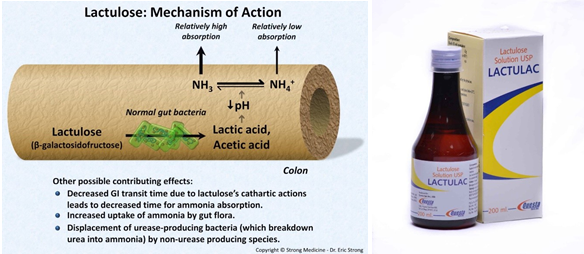A client with hepatic encephalopathy is receiving lactulose. Which assessment provides the nurse with the nest information to evaluate the client’s therapeutic response to the drug?
Fingerstick glucose.
Serum electrolytes and ammonia.
Stool color and character.
Serum hepatic enzymes.
The Correct Answer is B
Lactulose is a medication commonly used in the management of hepatic encephalopathy. It works by reducing the absorption of ammonia in the gut, which is a toxin that can accumulate in the blood in patients with liver dysfunction.
Monitoring serum electrolytes and ammonia levels can help the nurse evaluate the effectiveness of lactulose therapy. Elevated ammonia levels can indicate that the medication is not effectively reducing ammonia absorption and may require adjustment in dose or frequency. Additionally, monitoring electrolyte levels can help detect any imbalances that may occur because of lactulose therapy.
Fingerstick glucose levels (option A) are not relevant to evaluating the therapeutic response of lactulose in hepatic encephalopathy.
Stool color and character (option C) may be monitored to assess the side effects of lactulose, such as diarrhea, but are not the best assessments to evaluate therapeutic response.
Serum hepatic enzymes (option D) may be useful in assessing the severity of liver disease but are not the best assessment to evaluate the therapeutic response of lactulose in hepatic encephalopathy.

Nursing Test Bank
Naxlex Comprehensive Predictor Exams
Related Questions
Correct Answer is B
Explanation
Spironolactone is a potassium-sparing diuretic that works by blocking the actions of aldosterone, a hormone that can lead to potassium loss in the urine. However, in some cases, spironolactone can cause hyperkalemia (high levels of potassium in the blood), which can be dangerous for patients with heart failure. Therefore, it is important to instruct the patient to limit their intake of high-potassium foods such as bananas, oranges, tomatoes, spinach, and salt substitutes containing potassium.
Option a (Replace salt with a salt substitute) is incorrect because salt substitutes often contain potassium, which can further increase the risk of hyperkalemia.
Option c (Cover your skin before going outside) is unrelated to the use of spironolactone and hyperkalemia.
Option d (Monitor skin for excessive bruising) is not directly related to the use of spironolactone and hyperkalemia, although it is a potential side effect of other medications used to treat heart failure.

Correct Answer is B
Explanation
Lactulose is a medication commonly used in the management of hepatic encephalopathy. It works by reducing the absorption of ammonia in the gut, which is a toxin that can accumulate in the blood in patients with liver dysfunction.
Monitoring serum electrolytes and ammonia levels can help the nurse evaluate the effectiveness of lactulose therapy. Elevated ammonia levels can indicate that the medication is not effectively reducing ammonia absorption and may require adjustment in dose or frequency. Additionally, monitoring electrolyte levels can help detect any imbalances that may occur because of lactulose therapy.
Fingerstick glucose levels (option A) are not relevant to evaluating the therapeutic response of lactulose in hepatic encephalopathy.
Stool color and character (option C) may be monitored to assess the side effects of lactulose, such as diarrhea, but are not the best assessments to evaluate therapeutic response.
Serum hepatic enzymes (option D) may be useful in assessing the severity of liver disease but are not the best assessment to evaluate the therapeutic response of lactulose in hepatic encephalopathy.

Whether you are a student looking to ace your exams or a practicing nurse seeking to enhance your expertise , our nursing education contents will empower you with the confidence and competence to make a difference in the lives of patients and become a respected leader in the healthcare field.
Visit Naxlex, invest in your future and unlock endless possibilities with our unparalleled nursing education contents today
Report Wrong Answer on the Current Question
Do you disagree with the answer? If yes, what is your expected answer? Explain.
Kindly be descriptive with the issue you are facing.
